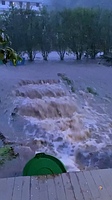Global Warming Hits Home
We thought we were safe here. Until now, Palisades hasn’t suffered much from the damaging effects of climate change: mudslides; tornadoes; forest fires; droughts; severe heat waves and floods. Sea-level rise and warm- ing temperatures have affected us, but gradually. We felt lucky to live here. But that changed on September 2, when Ida visited our area.
All night long, we were bombarded with impressive thunderstorms. Thunder pealed, lightning flashed across the sky and heavy rain poured down. Across the river, Westchester areas received a little less than seven inches of rain; we must have been close to that.
The next morning revealed the kind of damage we had never seen before. Emergency responders rescued more than 70 people from vehicles that became submerged in flood waters in New City, Tappan, Nanuet, Tallman and Spring Valley. Roads were closed. Mudslides composed of rocks, vegetation and soil slid down hillsides, threatening houses. Basements flooded, destroying water heaters and furnaces. Swimming pools filled with debris; some roads and driveways became impassible. The force of the water was powerful enough to tear up the edges of paved roads.
Everyone’s damage was different. Kathy Sykes describes what happened at their house. “We had five feet of water in the basement and lost our hot water heater and an element in our new furnace, which was installed a few days before the storm, needed replacing at a cost of $1500. We lost a large section of our deer fence, the result of the stream flooding. The insulation under our living room is being removed and then there will be spraying for mold. The remainder of the basement has been cleared of mud brought into it from water flowing into the living room crawl space, then down into the basement. It has been sprayed to eliminate mold. Our Audi was flooded; a visit to a repair garage determined that the car was totaled.”
Bernie Doyle was surprised when he found ornamental fish from the IBM property swimming around in his driveway. Matt Lonberg was astonished when he opened a door in his house and water poured in, spreading through the adjacent rooms. He rushed to open another door, and the water poured out, but in its progress it had ruined some of the floors in the house. The basement of the Palisades Community Center ended up with four feet of water in it; the water destroyed both the water heater and the boiler.
I was lucky – I had no damage from Ida. But for those who suffered losses, it was just the beginning of a difficult process. First one had to file a claim with one’s insurance company. This would probably be denied, unless you had flood insurance, something that those of us living in Palisades never thought we needed.
The next step was to file a claim with FEMA. Because of the severity of the damage here, Rockland County was declared a Federal Disaster Area. A special FEMA office opened in Orangeburg, giving hope to people who had suffered thousands of dollars of damage from Ida. But many kinds of damage seemed to be excluded. One Palisades resident found that there would be no recompense for the thousand-dollar cost of cleaning out her basement. Swimming pools filled with debris were not counted as part of the property, and therefore no financial help could be awarded.
For several years, average global surface temperatures have consistently reached 1.1°C above their pre-industrial values. We had hoped to hold the world to a temperature increase of 1.5°C, but this now seems unlikely, since our use of fossil fuels is still rising. Scientists have observed unusually fast-rising temperatures in the North Atlantic Ocean, as well as alterations in wind patterns that are now tending to send that warmth to the U.S. coast. As a result, the Northeast is heating faster than other parts of North America Both Northeastern winters and summers are getting warmer. Increased precipitation is expected to continue, with more devastating storm events and heavier downpours. Sea levels along New York's coast have already risen more than a foot since 1900. What we saw on September 2 is the beginning of the new normal. In our area, fewer red leaves on trees in the fall, fewer songbirds, and a real reduction in the number of insects in our environment are also part of the new normal.
All of these climate events are not going away for hundreds of years, even if we succeed in lowering the use of fossil fuels to the point where we are no longer increasing carbon in the atmosphere. We had high hopes for COP26, but a report by Climate Action Tracker states that even with all the pledges made at the Glascow meeting, the world is still on track to reach 2.4 degrees of warming this century.
A dire situation like this requires united, bipartisan action. However, with 95% of the people in one political party believing that global warming is a danger to the future of human beings and only 39% of the other political party agreeing, meaningful political action in this country seems far in the future.
It is easy to feel despair at this situation, especially when we envision the world that our grandchildren will have to live in. But I find that it helps to take positive actions that will lower fossil fuel emissions. There are a number of practical steps that one can take.
Get your electricity from solar panels, either on your roof or in solar farms upstate. These farms deliver electricity to Orange and Rockland as a credit to your utility bill.
Buy an electric car. There is already a charging station in Piermont.
Cut down on eating meat, especially beef. It's better for your health and for the planet.
Only have leaf-blowing take place on your property in the fall, and urge your landscaper to use electric, not gasoline blowers. Many communities have already banned gasoline-powered leaf blowers because of the damage they do to the environment and to the people who use them.
Install an electric heat pump in your house. Energy prices are going up this winter, the cost of electricity by six percent, the cost of natural gas by 29%, heating oil by much more. So a heat pump might save you money in the long run.
I have no idea what our climate situation will be ten years from now. If we can work together to reduce emissions, life will be better in the future for everyone. If our polarization continues, if we close our eyes to the reality of what's happening and refuse to take action, large areas of the world to come may be uninhabitable. And future generations will not forgive us.



